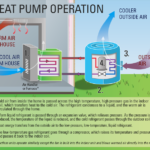The Inflation Reduction Act Brings Down Costs and Boosts Energy Supply, Cutting Inflation and Making Historic Investments – Center For American Progress
Energy Disrupter

On Wednesday, July 27, 2022, Senate Majority Leader Chuck Schumer (D-NY) and Sen. Joe Manchin (D-WV) issued a joint statement announcing their agreement to move forward with legislation—called the Inflation Reduction Act—that would address climate change, tax reform, prescription drug reform, and health care costs through the fiscal year 2022 budget reconciliation process. This would be a historic accomplishment in tackling the long-standing crises of climate change and health care costs, and the legislation would also address inflation—an urgent challenge.
Inflation occurs when there is a mismatch between supply and demand: Prices rise because there is too little supply to keep up with demand. Inflation is happening around the world in 2022, amid two years of supply chain disruptions due to the COVID-19 pandemic and Russia’s war in Ukraine. To combat this phenomenon, the Inflation Reduction Act would close loopholes exploited by corporations and the wealthy and crack down on tax cheats. These actions decrease demand, because fairer taxes help reduce excess demand. Meanwhile, the legislation increases supply through smart investments in domestic manufacturing and clean energy. The Inflation Reduction Act would also lower the cost of energy, prescription drugs, and health care premiums—some of the biggest expenses squeezing families.
This fact sheet details just a few of the ways the Inflation Reduction Act would lower inflation.
The Inflation Reduction Act lessens demand
UCLA economist Kim Clausing has noted that ensuring the wealthiest corporations and individuals pay their fair share in taxes is anti-inflationary. Indeed, fairer taxes help reduce inflation by decreasing excess demand, including through less disposable income and consumption. The core tax measures in the Inflation Reduction Act include:
- $313 billion in revenue raised from a 15 percent corporate minimum tax
- $124 billion in revenue raised from better IRS tax enforcement
- $14 billion in revenue raised from closing the carried interest loophole
The Inflation Reduction Act increases supply
The Inflation Reduction Act relieves the threat of supply chain bottlenecks by investing in domestic manufacturing and deployment of reliable clean energy that will bring down long-term costs. Expanding domestic clean energy capacity means that energy prices will be less vulnerable to global supply shocks in the future.
The Inflation Reduction Act pushes down the cost of key consumer expenses
Most people experience inflation through the prices they pay for their regular expenses. Keeping prices down for categories of major purchases, such as health care and energy costs, has a significant impact on household budgets. While lower prices can increase demand, the net effect is likely still lower inflation.
The Inflation Reduction Act pushes down costs in the following ways:
- The legislation empowers Medicare to negotiate prescription drug prices directly, ensuring that seniors get better deals on their medications, and caps Medicare beneficiaries’ out-of-pocket costs for drugs at $2,000 per year. Millions of people would also have lower net health insurance costs because the Inflation Reduction Act extends enhanced Affordable Care Act premium tax credits for the next three years.
- The legislation provides money for home energy rebates, consumer tax credits for energy-efficient homes and vehicles, and grants to make affordable housing more energy efficient. These measures would help reduce energy costs for families by more than 10 percent on average.
The Inflation Reduction Act decreases the deficit
Taken together, the Inflation Reduction Act’s measures would reduce the budget deficit by more than $300 billion over the next 10 years, reducing inflationary pressures in the process. Yet this estimate is highly conservative; many experts agree that the IRS funding would produce much more revenue than estimated, especially by deterring tax cheats. And the deficit is already projected to come down by $1.7 trillion this year.
The Inflation Reduction Act puts less pressure on the Federal Reserve to raise interest rates
As the Inflation Reduction Act reduces inflation, the Biden administration is helping to decrease pressure on the Federal Reserve to aggressively increase interest rates, which should help avoid a potential recession. Rapidly increasing interest rates risk higher unemployment and reduce people’s ability to buy a home. Fortunately, the Inflation Reduction Act offers additional tools, such as no new taxes on small-business owners or families making less than $400,000 a year. Only wealthy corporations currently paying less than a 15 percent corporate tax, Wall Street fund managers exploiting the carried interest tax loophole, and cheaters who aren’t paying the taxes they already owe would now have to pay their fair share.
See also
Conclusion
From day one, President Joe Biden has made lowering prices for everyday Americans a central focus of his presidency. The Inflation Reduction Act would supplement measures to strengthen the labor market and lower the cost of gas and groceries, creating a stronger economy for all. Anyone who truly cares about the cost-of-living pressures facing Americans today must work to pass the Inflation Reduction Act as soon as possible.















